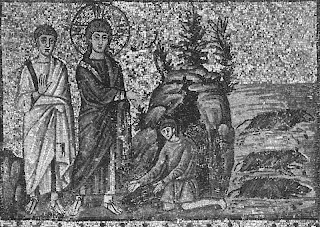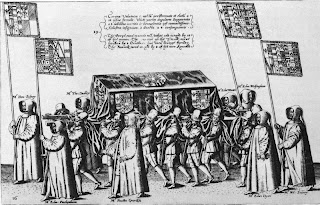The cleric part of my recent XP awards post was becoming too complicated, so I decided that it deserved its own space. The process of thinking through what clerics would spend money on was also revealing lots of setting details which seem naturally to belong together. See also the general post on clerics for more background. So here, without further ado, are some ways for clerics to convert their GP to XP, and serve their order in the process.
NAMING. Knowing the true name of a person or creature gives you power over them. Demons and sorcerers are particularly vulnerable to someone that has their true name. Thus, where possible, it is traditional to have a cleric perform a naming ceremony. In the process, the cleric will discover the person’s true name, and record it in the hidden language of law. That cleric, and any of their acolytes, will have access to this true name in the future. They will also sometimes bestow a use-name (some people consider this lucky). Most people willingly entrust their true name (and the true name of their offspring) to the clerics, because they would not want to live as a diabolist (and it is assumed that demonic influence is behind people becoming diabolists). Rich people will be able to pay for the entirety of the ritual, but the poor are dependent upon the cleric’s generosity. The ritual components cost 1d4 * 100 GP and require one day to prepare and execute. The procedures involve preparing special incense, meditation, and copying certain scriptures. When clerics meet, one of the common tasks is to exchange the true names so collected.
CONSECRATION. Some sites have been tainted in a way that can only be purified by the mysteries of the light. In addition, once hauntings have been dealt with, the sites must often be blessed. Cost is 1d6 * 100 GP plus a save versus magic to avoid consequences. Shrines may also be constructed for a similar cost, and do not require a saving throw (though they are really only worthwhile in a town or settlement that does not yet have a shrine). If the shrine houses a relic (the remains of a fallen cleric), special procedures are required (in addition to the return of the relics, if they are missing). Such a shrine has a level and can be used by clerics during level up. The cost of the consecration ritual is 1000 GP * level, in addition to any architectural costs required. The shrine of a great matriarch or patriarch, for example, may be an elaborate affair.
EXORCISM. Much like naming, rich people will be able to pay for an exorcism, but the poor will not. The components for an exorcism cost 1d6 * 100 GP and the ritual will usually take one day, but may take longer depending on the strength of the possession. A save versus spells is required for complete success, and a fumble may have extremely dire consequences (but then, continuing demonic influence may also have dire consequences).
EXEGESIS. The Mysteries of Light are deep, and there is always more to discover, both in the scriptures themselves, and by communing with higher powers. This functions in the same way as magic research, and also requires a save versus spells to avoid unintended consequences, such as the attentions of dark spirits.
JUDGMENT. In addition to being demon hunters, clerics carry the law of the True Empire wherever they go. This is one of the reasons that they often have problematic relationships with secular authorities in these degenerate times. Many clerics seek out the worms nestled in the timber of civilization. Communities generally don’t like to expose the skeletons in their closets on their own, so clerics must bring their own resources to bear on the problem. Spend 1d6 * 100 GP and make a wisdom check (less than or equal to on a d20). If successful, roll on the Pronouncing Judgment table (which I admit does not exist yet, and so will require improvisation). Otherwise, roll on the complications table (also still imaginary). Note that adventure leads, rumors, and other info may be discovered in the process of judgment.
LAST RITES. The dead are particularly vulnerable to the attentions of necromancers and demons. Some believe that souls are unable to find their way to the afterlife without the final rites. Others believe that eternal peace and extinction of the soul (the alternative being endless purgatorial wandering) require a cleric’s rites. The mysteries are silent regarding the truth (at least, silent to the uninitiated), but few wish for their fate to be unending undeath, forever hungering again for the warmth of life. Cost is 1d6 * 10 GP for a commoner’s funeral in addition to an evening of work (or a full day if a gravedigger is not available). The rich will demand more lavish affairs, and will generally be able to pay for them. Putting the spirit of a great adventurer to rest, however, is a more involved affair and requires 1000 GP per level of the deceased character. However, such expenses are often wise: the wraith of a powerful warrior is a terrible thing to behold.
INITIATION. Most people cannot become clerics on their own (though there are exceptions, people who are able to figure out the beginning of the mysteries on their own, either from the panoply of a fallen cleric, or from visions). Instead, they must be initiated by an existing cleric. Clerics of fourth level or higher may initiate new clerics. This requires the copying of a holy book, and a ritual that consumes many rare components. The total cost is 1000 GP. Because of the great expense and effort that initiation involves, generally the aspiring cleric will serve a period of apprenticeship and training beforehand. The new cleric begins with the title Acolyte.
Note that most of these prices are either guesses or loosely based on the carousing costs. I reserve the right to change them later based on play experiences.



I wanna do all of these at least once, though I need to stop being poor first xD